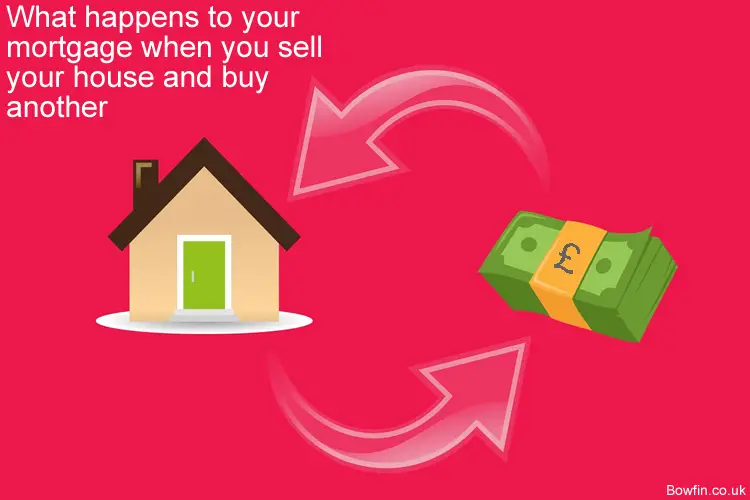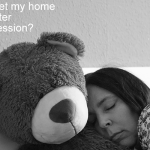
If you’ve never sold a house before, this can be a bit confusing. Don’t worry you’re not alone! You may find yourself scratching your head. You may also be wondering what happens to your mortgage when you sell your house and buy another.
So what happens to my mortgage when you sell your house? When you sell your house to buy another the mortgage on your current house is repaid. Your mortgage is secured on your property, which means your lender won’t allow you to sell it unless the mortgage is repaid in full. But they will allow your current mortgage to be ported to your new home subject to their approval.
When you sell your home, a part of the sale proceeds are used to pay off your mortgage. Then so long as you have enough equity in your home, you’ll have enough money leftover from the sale to put towards your next purchase.
But if you don’t make enough from the sale of your home to pay off your mortgage, you will end up having to make up this shortfall and pay off your mortgage before the sale can proceed.
What happens to your mortgage when you sell your house and buy another in more detail
When you sell your home, you’ll use the proceeds from the sale to firstly repay your mortgage. This is because the mortgage will be ‘secured’ on your house.
‘Secured‘, or what’s known as ‘having a charge on your house, simply means that if you fail to repay your mortgage, your mortgage lender has legal paperwork in place to make sure their loan is repaid. In fact in the UK you can’t sell your house until your mortgage has been repaid in full.
More Reading: How to deal with the stress of selling your house (How to avoid the stress)
The balance of the proceeds of sale when you sell your house can be used towards the deposit for the purchase of your new home. This is if you have equity in your house.
Your home’s equity is the difference between the fair market value of your property, less what you owe on your mortgage and/or loans secured on your home. When you buy another home, you’ll probably require a new mortgage to cover the full purchase price.
More Reading: What does it mean to have equity in your home? (How home equity works)
Things to be aware of when you sell your house to buy another
- Penalty periods and penalties on repaying your mortgage early.
- Porting your mortgage.
- Negative equity.
Let’s take a look at these in a bit more detail.
1. Penalty periods and penalties on repaying your mortgage early
When you take out a mortgage you are sometimes offered great interest rates. But often times in return for such a great interest rate, your mortgage lender will want to lock you in to a certain period of time.
What you’ll find if this is the case is in your mortgage terms there may be early repayment charges. These early repayment charges can in some cases be very expensive. So be very careful when you come to sell your house that you’re not in a mortgage penalty period.
However, this leads on to the next point, which is to check if your mortgage is portable.
More Reading: Do you have to sell your home before buying a new one?
2. Porting your mortgage
If you have penalties on your mortgage by repaying it before the end of the penalty period, you will have to pay these penalties in addition to what the outstanding mortgage is.
Can I transfer my mortgage to another property
However, check to see if your mortgage is portable. If it is, you may be able to transfer your mortgage to another property.
If it is transferable, you may be able to port it to your new home and avoid the penalties.
However, whilst this sounds like a great idea, if the new house you’re buying is more expensive than your current home, your present mortgage may not be sufficient to make the move possible.
Instead you may need to get a new increased mortgage. Alternatively, you may be able to request a top up of your current mortgage. Which of course will be subject to your lender’s lending criteria.
The other thing to be aware of when transferring or porting your mortgage is the associated fees to do so. Mortgage lenders will usually charge fees to port your mortgage.
3. Negative equity
Another consideration is if you’re in negative equity. Whilst not as many homes across the UK are now in negative equity, this may still affect you.
Negative equity is where the amount you owe on your mortgage is greater than the value of the home you live in.
This would mean that the sale proceeds when you sell your home won’t be enough to cover what’s owed on your mortgage.
More Reading: Can’t sell house for what I owe? (7 solutions to help you move forward)
In this instance what happens to your mortgage when you sell your house and buy another is it would still need to be paid by you. But you would have to top-up the difference.
This difference will be the total amount owed on your mortgage, less the net proceeds of sale (i.e. less any estate agents fees).
More Reading: What Is Negative Equity (Negative Equity Example)
I hope this article has helped on what happens to your mortgage when you sell your house and buy another
If this article has helped on ‘what happens to your mortgage when you sell your house and buy another’ please share it on your favourite social media site.
Also, if you have any questions, please feel free to comment below too. Alternatively, if you need more help, please feel free to contact us on our contact us page here. Or join the discussion and ask your question in the property forum.




